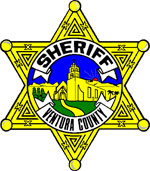|
By Mariandrea Mueller — Wednesday, May 6th, 2009
The Fillmore Unified School District (FUSD) Board Meeting was held May 5, 2009. The audience was smaller than at previous meetings, but the teachers' union (FUTA) President Theresa Marvel attended, as did staff union (CSEA) Executive Board Member Sheila Duckett. The FUSD Board heard a report on the District-level English Learner Advisory Committee, approved the calendar for the 2009-2010 School year, approved a 3-year Technology Plan, and discussed a recent hearing regarding some of the layoffs. The Board approved the school calendar for 2009-2010. The Board had two choices, and, after expressing regret over the 2nd Quarter ending after Winter Break, chose Calendar B to avoid having a short first semester and long second semester. School will start August 26th (avoiding conflict with this year's County Fair August 5th-16th), and end June 17, 2010. During the discussion, FUTA President Theresa Marvel and Assistant Superintendent Evalene Townend fervently disagreed on whether the calendar development process had differed from previous years' methods. They agreed that FUTA had submitted a list of prioritized elements to be incorporated into the calendar, but Marvel claimed that in past years the calendar had been developed at the negotiating table. Townend said that FUTA's and CSEA's requests had been incorporated to the best of her ability. Marvel said that more teachers disapproved of both choices than in previous years. CONTINUED » |
|
By Anonymous — Wednesday, May 6th, 2009
Statement provided by Fillmore Teachers Association (FUTA) The Fillmore Unified School District Board of Education is currently considering a set of budget reductions recommended by the District Administration to balance the budget deficit that the District currently faces due to the State fiscal crisis. When the Board first started meeting this year at special Budget Study Sessions to begin this process, it was the stated goal of both Board members and the District Administration to keep the necessary cuts as far from children and the classroom as possible. This goal made sense, inasmuch as it is the purpose of the School District is to educate the children of Fillmore, Piru and Bardsdale. As the Budget Study Sessions got underway, a series of recommendations for cuts were made. Theresa Marvel, Fillmore High School teacher and President of the Fillmore Unified Teacher’s Association (FUTA), which represents the teachers and other certificated employees of the District, regularly attended these sessions and noted which cuts were being recommended. As the weeks passed, and the recommendations mounted, it became apparent to Ms. Marvel that in contrast to the stated goal of the Board and the District, the vast majority of the cuts being recommended directly impacted children and their education. CONTINUED » |
|
By Anonymous — Wednesday, May 6th, 2009
 Dorothy Keefe Crosby, 76 of Santa Maria, was killed April 29th in a solo rollover accident. The crash took place near the eastern border of Ventura County, between Piru and the Los Angeles county line. Crosby died of multiple blunt-force trauma. She was driving eastbound at 11:18am, when she lost control of her car. The car landed on its roof (pictured far left parallel to fire engine). Crosby was pronounced dead at the scene. A rescue copter was called in, pictured center. Photo courtesy Henry Negrete. Enlarge Photo |
|
By Anonymous — Wednesday, May 6th, 2009
 Owner Cheryl Mattley (and daughter Sarah Butler) is closing Joanna’s Ice Cream Shop after 10 years in Fillmore (two on Central Avenue and eight on Main Street, in Central Park). Enlarge Photo |
|
By Anonymous — Wednesday, May 6th, 2009
District Attorney Gregory D. Totten announced today that Enrique (Erick) Boelcke (DOB 08/17/44), formerly of Santa Monica, was sentenced to serve five years and four months in state prison for embezzling from his former employer, Santa Clara Organics. |
|
By Anonymous — Monday, May 4th, 2009
Ventura, CA. - The Ventura County Public Health Department announced the fifth probable case of swine flu on Monday. This new case is the first case in the east county, identified as a high school student from Newbury Park High School. Due to the contagious nature of this virus, the Public Health Officer, Dr. Robert Levin, has decided to close the high school, for an undetermined amount of time, as well as call for the cancellation of the school's annual prom, set for this Saturday. For more information please call Sheila Murphy at 805-677-5274 or 805-637-4955. |
|
By Anonymous — Monday, May 4th, 2009
Ventura, CA. - The Ventura County Public Health Department today identified a fourth probable case of swine flu. This new case is the third school-aged child, and the second identified as a student at Art Haycox Elementary School. “This is the second student from this school to be diagnosed as having this virus,” said Dr. Robert Levin, Public Health Officer for Ventura County. Dr. Levin called for the closure of Art Haycox Elementary school last Thursday, April 30th, as well as Blackstock Junior High, where a third student attends school. Another case, an adult who resides in Ventura, was identified late Thursday afternoon. |
|
By Anonymous — Thursday, April 30th, 2009
Ventura, CA. - The Ventura County Health Care Agency and the Public Health Department announced late today that it has identified two probable cases of swine flu in Ventura County. The Public Health Laboratory identified the two positive results early Wednesday evening. These are the first cases of swine flu to be identified in this county. Elsewhere in California, 14 cases have been confirmed as well as another 28 probable cases. Swine flu has now affected 91 people in the United States. According to Dr. Robert Levin, Public Health Officer for Ventura County, these cases are not entirely unexpected, as the Public Health Department has been aggressively seeking out potential cases since the swine flu outbreak was first made public last week. The Public Health Department has been diligently practicing surveillance on patients treated throughout the county with flu-like symptoms, especially those who have had recent travel to or from Mexico. “This is not a surprise that we would identify swine flu in our county,” said Dr. Levin. “We’ve been expecting it. But it’s not a time for panic, either. We have an adequate supply of Tamiflu available for these patients and are well-prepared to care for them as well as any potential patients who may be in our community.” In order to minimize the spread of disease, the county health officer asked the superintendent of the two involved schools, Art Haycox Elementary School and Charles Blackstock Junior High School, to close down for approximately one week beginning the April 30. Health officials are asking that any children who attend these schools who develop a fever and flu-like symptoms should see their physician. Also, while these children are out of school, they should avoid group activities. County health officials today activated the JIC (Joint Information Center) to coordinate information that will be sent to area school districts and community members. Residents are encouraged to use good health habits, such as frequent hand washing, using alcohol-based hand sanitizers, coughing and sneezing into the crook of their arms or into their shoulders, using and then disposing of Kleenex, and staying home from school or work if they are ill. The county’s Department of Public Health will continue to monitor reports of patients treated throughout the county and will make information available regarding any additional cases of swine flu. People suffering from flu-like symptoms should seek medical care from their regular health care provider and should stay at home if they are feeling ill to prevent the spread of any illness. Those who feel ill but cannot afford to see a health care provider are encouraged to seek treatment at any county clinic for low, or no cost treatment. The national Center for Disease Control has advised against any non-essential travel to Mexico, where the swine flu is believed to have originated. Anyone returning from recent travel to any county or country with reported cases of swine flu should monitor their health for 7 days and seek immediate medical attention if they develop a fever along with flu-like symptoms, including cough, sore throat, loss of appetite, fever and fatigue. For more information about swine flu and the county’s response to this serious health threat, visit the public health website at www.vchca.org/ph. For additional information please call Sheila Murphy at 805-677-5274 or 805-637-4955. |
|
By Anonymous — Wednesday, April 29th, 2009
 Pictured above (center) are Miss Fillmore Kyla Hernandez, (left) 1st Princess Janelle Burningham, and (right) 2nd Princess Torey Perez. Enlarge Photo |
|
By Anonymous — Wednesday, April 29th, 2009
 Pictured above are (center) 2009 Miss Teen Fillmore Roxy Neal, (right) 1st Princess Chloe Kelloer, and (left) 2nd Princess Julia Valenzuela. Enlarge Photo |




